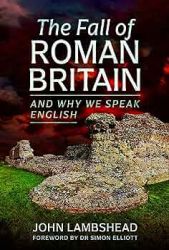When we speak of the fall of the Roman empire, we’re usually engaging in hyperbole: Rome’s decline in Europe was more of a slow decay and transformation. In Britain, though, first Rome was there and then it wasn’t — and seemingly overnight, the Romanized Britons were displaced by German tribes, chiefly the Angles and Saxons. The Fall of Roman Britain takes the unusual approach of examining historical questions via scientific means: attempting to track population movements through comparative carbon-dating and genetic comparison, linguistics, and climatic fluctuations to try and understand the great migratory push that saw the Germanic tribes pushing across the Danube into Roman territory, etc. The scientific means are not the only ones, though: Lambshead also incorporates the history of western Rome’s political chaos. Fundamentally, Lambshead attacks two questions: why Roman Britain failed so dramatically and so thoroughly, and why the Anglo-Saxons so completely supplanted the native Britons. To reduce both down: the attempt to create a Roman Britain never fully developed, in part because Britain was isolated from the continent and in part because the civic infrastructure that needed to grow was collapsing on the continent itself, replaced instead by pure military dictatorship, which in Britain deformed the economy such that when Rome began withdrawing troops, the economy collapsed with it. As to the second question, Lambshead argues that the Britons, with a strong aversion to cities, were separated into many isolated pockets (something substantiated by genetic studies that undermine a ‘general’ Celtic gene pool): the Saxons brought with them a more collaborative and cohesive culture, resulting in the establishment of warring kingdoms, not simple tribes. (Honestly, if you feel like cheating you can just skip to page 200 or so, because Lambshead does a summary of his cross-disciplinary studies.) Personally, I don’t know enough about late-Roman Britain or sub-Roman Britain — especially its economy — comment on its substance, but I was most interested in the notion of the Britons being a quilt of distinct genetic groups rather than a more mixed group. This subject warrants more digging, though I’m more interested in the establishment of Anglo-Saxon ‘Britain’ than anything else.
- Follow Reading Freely on WordPress.com
Reading Now
-
Recent Posts
Categories
Blogroll
- Seeking a Little Truth
- The Social Porcupine
- Inspire Virtue
- Classics Considered
- With Freedom, Books, Flowers, and the Moon
- The Inquisitive Biologist
- Relevant Obscurity
- Trek Lit Reviews
- Stoic Meditations
- A Pilgrim in Narnia
- Gently Mad
- The Frugal Chariot
- Lydia Schoch
- The Classics Club
- Fanda Classiclit
- Reading In Between the Life
- The Bilbiphibian
Archives
Meta


I have a few books on Roman Britain coming up later in the year including:
Britain After Rome – The Fall and Rise 400-1070 by Robin Fleming.
The other books that might interest you are:
The Anglo-Saxons – A History of the Beginnings of England by Marc Morris
The Tribes of Britain – Who Are We and Where Do We Come From? by David Miles
Oh, yeah. Definitely interested in the latter two!